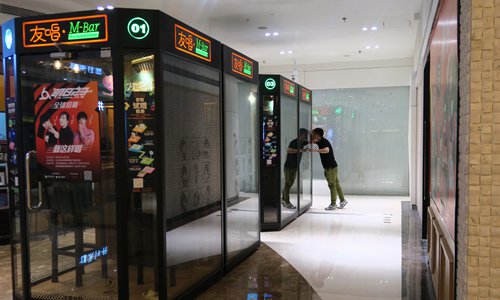
Mini-karaoke booths are spreading across the country and gaining popularity among young people. (Photo: Li Hao/GT)
Small karaoke booths may be the future of the sharing economy thanks to low risks and quick returns: experts
Telephone box-like mini-KTV booths have been appearing in shopping malls across the country in recent years. With the increasing popularity of the new entertainment-sharing service, it has also become attractive to capital markets. Analysts say that the short period of time to get returns as well as relatively lower risks are reasons why mini-KTV is favored by investors. Although its growth is driven by the context of the sharing economy, some challenges still remain, including whether business operators can master big data technology to understand the markets.
Starting from this year, an increasing number of small karaoke booths that resemble telephone boxes have been popping up in countless shopping malls across the country.
Different from traditional karaoke rooms, the mini-KTV booths are self-serviced and more personalized. By scanning a QR code via Chinese popular instant messaging app WeChat, customers can use the system to record a song or even an album. The whole album process takes no more than one hour, which is far less than the time it would take in the traditional recording industry.
"It is very convenient and I often use the entertainment service when I have some time to kill, such as the 20 minutes before a movie starts," said a 20-something Beijing resident named Vincent Chen.
"I can book the booth for at least 15 minutes and the recording will then be automatically sent to my phone through WeChat," Chen told the Global Times on Monday. "Then I am able to also share my songs to other social media platforms."
As the combination of traditional entertaint and digital technology continues to enjoy great popularity, analysts say that the business pattern behind mini-KTV reveals the rising momentum of the sharing economy in China.
Expanding nationally
Mini-KTV booths first entered domestic markets in 2015 in cities like Guangzhou, capital of South China's Guangdong Province, and Xiamen, East China's Fujian Province, and then spread to other cities across the country.
Common KTV brands include M-Bar, Minik and WOW.
Created in Xiamen in June 2016, M-Bar has expanded to about 140 cities in 29 provinces with more than 5,000 KTV entertainment units, according to media reports. It would cost a user 20 yuan ($3) for 15 minutes using an M-Bar KTV system, 38 yuan for 30 minutes and 58 yuan for one hour.
Minik, which is backed by Guangzhou-based Aimyunion Technology Co, was launched into the markets in the second half of 2015 and has now spread to more than 500 cities in the country, domestic news portal qq.com reported on June 29. Users can spend 6 yuan on one song in a Minik unit or 20 yuan for 15 minutes of karaoke time.
The number of users registered with Minik reached more than 10 million by the end of June, with over 6 million stable fans, the report said, noting that apart from those common brands, more and more small and medium-sized brands are beginning to beef up efforts to grab some shares of the market.
"The development of mini-KTV meets the demands of young people in current society, who live fast and fun lives and are eager to make good use of their spare time," Liu Dingding, a Beijing-based independent analyst, told the Global Times on Monday.
Liu said that the rapid growth of China's mobile payment tools in recent years also facilitates the advancement of the mini-KTV service.
"But such types of entertainment services are designed just for a niche market, especially for those living around densely populated areas like shopping malls in first-tier cities," Liu noted.
Currently, mini-KTV markets in first- and second-tier cities have saturated, causing new franchisers to be advised to explore markets in third- and fourth-tier cities, domestic financial news portal nbd.com.cn reported on July 4, citing a sales person with mini-KTV operator Huanle Changba.


















































